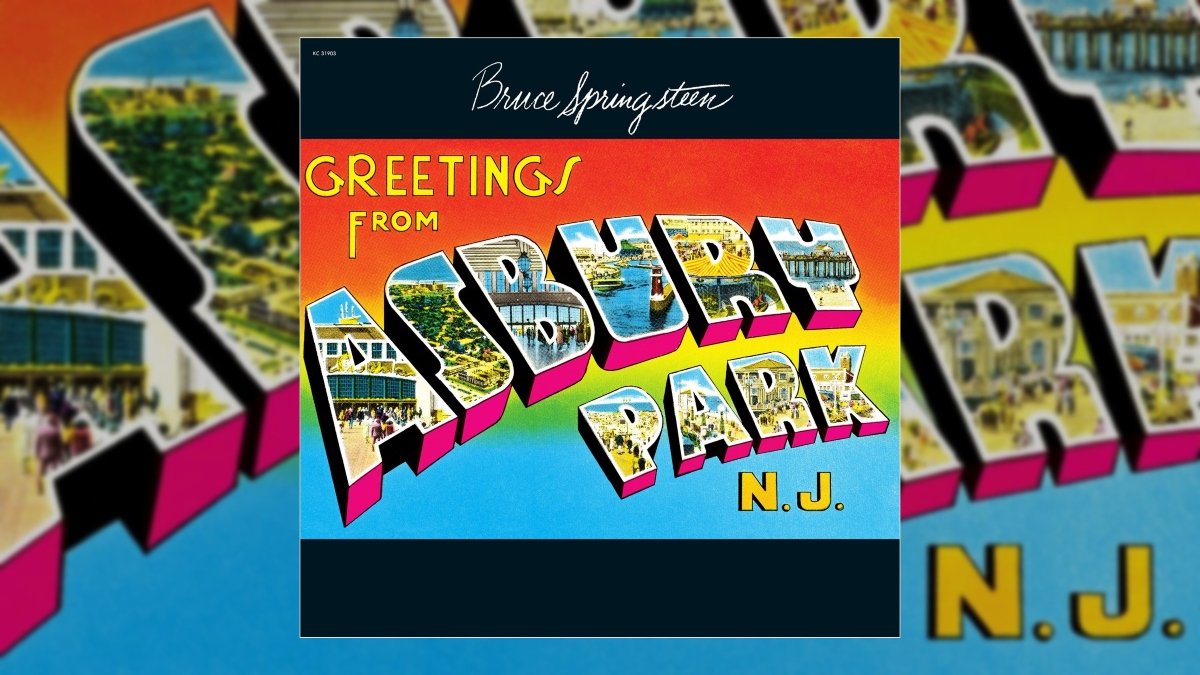Happy 50th Anniversary to Bruce Springsteen’s debut album Greetings From Asbury Park, N.J., originally released January 5, 1973.
When people tell me that they don’t like Bruce Springsteen, I gently suggest Greetings From Asbury Park, N.J. (1973). To truly get Springsteen, you need to make your way to this collection of scrappy, wayward dreams. On Born To Run (1975), Darkness On The Edge Of Town (1978), and The River (1980), Springsteen would perfect the image of the daydreamer looking for a way out of his one-horse town. But you don’t get those albums without Greetings, because Greetings is simply the sound of that town. You can’t make an escape if you’re not from somewhere, and this record is that somewhere.
Having made his reputation as a boardwalk guitar-slinger (not as a songwriter), Springsteen had a decade of bar-band experience behind him before cutting a record. So, when you drop the needle and careen into the guitar riff of “Blinded By The Light,” you smash-cut into a career already in progress: someone who hasn’t made it to the outside world yet and who’s operating from within the universe that raised him. This is the only Bruce Springsteen album that lacks self-awareness or mission. This is just the way things are.
Case in point: that opening track, “Blinded By The Light,” is absurd. If someone used a rhyming dictionary to cram lyrics into a song in the year of our Lord 2023, they’d probably be laughed out of town. It wasn’t even fashionable at the time; when it was covered by Manfred Mann in 1976, it was stripped of all of its zaniness in favor of a super serious synthesizer and some disoriented half-time drumming. By Born To Run, Springsteen had learned to pare down his lyrics in the name of aesthetic palatability, but none of the material that came next is as purely fun as Greetings.
Which is not to say that I dislike Springsteen after 1975. I obviously do. But there’s something to be said for the fact that the E Street Band is lauded for being America’s greatest bar band even when they’re playing football stadiums: they’re embodying the sound from Greetings.
The intense boardwalkiness of Greetings From Asbury Park, N.J. comes from two places, the first of which is personnel. In these early days, Springsteen was backed by Vini Lopez on drums and David Sancious on keyboards, neither of whom would stick around for Born To Run. Sancious and Lopez came from jazz backgrounds, so Greetings (and its sublime successor, 1973’s The Wild, The Innocent, and the E Street Shuffle) has a loose, shaggier sound than the one we’d associate with tightly controlled projects like Born To Run or, especially, Born In The USA (1984). These early records don’t propel endlessly forward; they’re circular, sometimes gratuitous, the sound of a band trying to fill hours-long late-night sets.
Listen to the Album:
The other substantial difference between the Greetings era and work commonly associated with Springsteen’s prime is the narrative voice. “Spirit In The Night” is the best example; in the second verse, the narrator finds himself in a boozy slow-dance with Janey by the shore of a lake, and as they lean in for the kiss, he feels like, well, a spirit in the night. The point of the song is the levity, the kiss, the goodness of the moment. It fixes a fleeting moment in place.
There’s no looming catastrophe on the horizon or great spiritual significance given to the moment. In later concerts, Springsteen would introduce the song with a big, churchy, “can you feel the spirit” introduction, in an attempt to sanctify the tune and separate the show from the secular world outside the venue. But on the record, “Spirit In The Night” doesn’t need any of this pomp and circumstance because there is no outside world.
But Greetings is not all fun and games. Two of the record’s tentpoles, “For You” and “Lost In The Flood” are absolute heartbreakers. (“The Angel” and “Mary Queen Of Arkansas” go for heartbreak, too, but come up short.) “For You” hangs onto the manic sound that defines Greetings, but in service of a crazed feeling of helplessness in the face of a girlfriend’s spiraling mental health. “Lost In The Flood” is a predecessor to “Jungleland,” painting a portrait of city life that has none of the grandiosity that we associate with Born To Run’s epic finale: it feels rawer and more hopeless than anything Springsteen would release until “Nebraska.”
“Lost In The Flood” gets its power from its first-person perspective. On later records, Springsteen would channel his depiction of hopelessness and rebellion through character sketches (perhaps as he got more popular, the credibility of an “I” got less plausible). This use of first-person is not only linguistic; the very sound of “Lost In The Flood” is in the narrator’s head. The bluster of the instrumentation would be melodramatic on Darkness On The Edge Of Town, when the album’s purpose was description. Here, the purpose is expression: the roars and swells of this song are the feeling, not a story about them.
Greetings From Asbury Park, N.J. is singular in the Springsteen oeuvre because it has everything to prove but has no idea what “prove” really means. It’s goofy and fun and sometimes sad, and I treasure it for the songwriting and the special sound lent to it by Sancious and Lopez. It fills your spirit in a way that no other work can. I don’t think of it as the start of a journey; I think of it as a journey not yet begun, the sound of home. In two years, everything would change, but we will still always have the sound of the night by the lake.
LISTEN:

